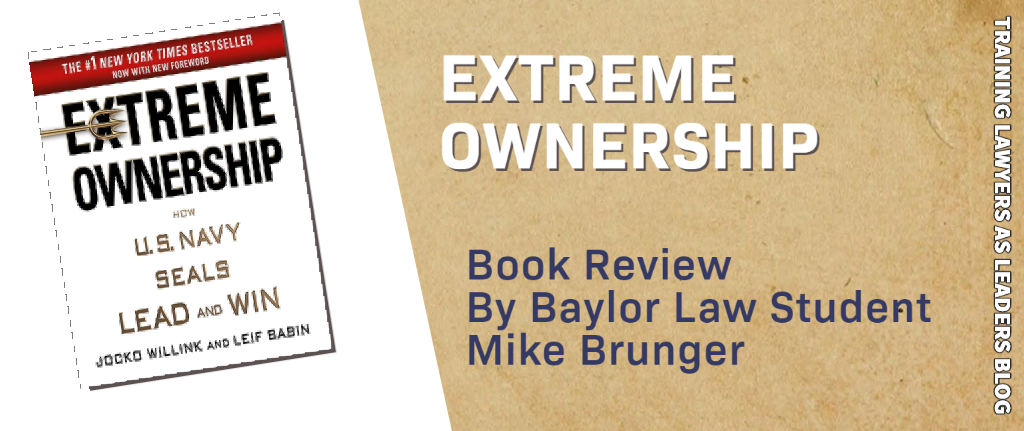
Guest Post by Baylor Law Student Mike Brunger
The following post is a book review written by Mike Brunger, a student in our Winter 2022-23 Leadership Class. I hope you enjoy this book review as much as I did. – Leah
Extreme Ownership, by Jocko Willink and Leif Babin, is more than a book on leadership. It is a tool that can prove handy in anyone’s toolbox. This book is both captivating and easy to read. The authors present the reader with situations where ownership could be improved. But after employing Extreme Ownership principles in these situations, the results were incredible.
The authors, Jocko and Leif, served as Navy SEAL officers in SEAL Team Three. This Team, more commonly known as Task Unit Bruiser, is the most decorated special operations unit that has served in the Iraq War. Under Jocko and Leif’s leadership, Seal Team Three experienced some of the most taxing combat in the history of SEAL Teams.
After leaving active duty, Willink and Babin launched a company called Echelon Front and embarked on a mission to share their stories from the battlefield. Traveling the world, they teach business professionals leadership tactics, specifically the importance of ownership. Each chapter of the book focuses on a specific element of leadership.
They start each chapter by telling a story from their time with SEAL Team Three. The story usually takes place in a high-stakes combat situation. Then, Jocko and Leif apply lessons from that story to a problem in the civilian world. The typical scenario likely involves a CEO needing realignment within their organization. This book is very military-heavy; however, you do not have to have a military background to understand and embrace the concepts taught in this book.
My wife, Vanessa, is a hotel company’s Senior Vice President of Sales and Marketing. During the height of the COVID-19 pandemic, she started working from home. As travel abruptly halted, the hotel industry was left in financial ruin. At home, at the same time, I could hear her having very tough conversations with staff members. On more than one occasion, she could be heard sobbing after terminating a team member due to the lack of revenue. The pandemic was full of uncertainty and fear. Fortunately, my wife was never on the receiving end of one of those calls.
Vanessa was having a conversation with one of her sales leaders one day. Her employee was disgruntled, venting quite loudly. Vanessa listened as her employee explained how she needed help understanding why the corporate office was constantly requesting reports. Moreover, she stressed how her hotel was already short-staffed, and at times she was stuck behind the front desk checking guests in. Amassing all the requested information was time-consuming. Vanessa, acting as the liaison between her hotels and the corporate office, tried her best to explain the reasons why. The call soon ended.
I was sitting in our living room holding a copy of Extreme Ownership. My wife entered the room, ready to explode! She knew I likely heard the entire discussion. But, before she said a word, I handed her the book and said, “Look at chapter ten.”
Chapter ten discusses the importance of leading up and down the chain of command. More importantly, the chapter explains why. The chapter begins by taking the reader to the Euphrates River bank, where SEAL Team Three’s leaders prepare for a combat operation. Leif and Jocko had just received an email from the Team’s higher headquarters staff, led by their Seal Team’s commanding officer (CO). Leif was livid! In the email, their CO requested clarifying information regarding the operation the Team planned to execute within the next few hours. Leif could not understand how “they” do not know what the Team does, how hard they work, and how busy they are. Additionally, Leif did not know why they had to stop what they were doing to answer “idiotic” questions.
Jocko did his best to calm Leif down. The CO required answers before approving the operation. He tried to help Leif see their combat operations through the CO’s eyes. It was the CO’s job to approve every mission, and it was Jocko’s job to put the CO in his comfort zone so the operation could get approved. Leif began to understand.
The CO and his staff operated from an office in the United States. Therefore, they could not fully appreciate the hard work the Teams were conducting. The more Jocko pushed situational awareness up the chain, the more comfortable they became. Jocko explained the “why” by telling Leif, “We have to lead them.” The more the Team communicated up the chain of command, the less they were “badgered” by the CO.
Chapter ten got my wife’s attention and is just one of many great chapters that can be applied to all aspects of business and life. I recommend this book to anyone. My wife had a copy of the book sent to all her sales leaders. I look forward to hearing stories about how her organization has used this book.






